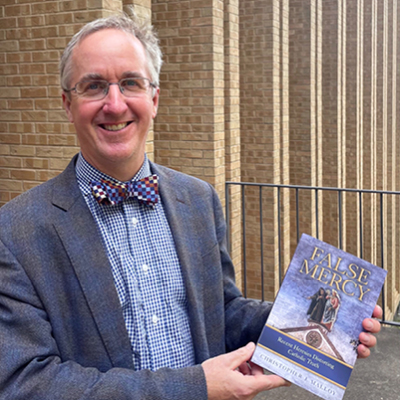 Menu
Menu

By Chrisopher Jay
We sat down with Associate Professor of Theology Christopher Malloy, Ph.D., to discuss his new book, False Mercy: Recent Heresies Distorting Catholic Truth.
I would say “false mercy” is affection divorced from truth. Most people have a natural disposition to be tender toward others and want that to be reciprocated. However, to offer tenderness without an orientation to the true good can be destructive. Real, genuine love for another requires a certain kind of firmness and willingness to speak truth. In the context of today, “false mercy” is the result of ignorance of or denial of nature and natural ends and a tendency to accept and affirm others’ desires and subjectivity regardless of their connection to truth.
Some reasons have to do with cultural factors in the postmodern world and society that we live in today. There are also internal ecclesial factors within the Church. For instance, there are certain theologians, priests and bishops publicly spouting their own opinions that are at odds with Catholic teaching, and this can cause others to conflate private opinions of these persons with actual Church teachings. Then there is the media, which often pounces on and magnifies some of the confusing statements made by representatives of the Church; the net result is further confusion and ambiguity.
It’s certainly good to appreciate a person’s dignity and subjectivity, but I think certain representatives of the Church have mistakenly leaned too far in this direction at the expense of affirming objective truths. When it comes to controversial topics, I think some have a tendency to err on the side of exonerating or excusing actions that are objectively sinful. I think there are a lot of good intentions behind this, and that it often comes from a place of wanting to accept and embrace others as they are. However, good intentions divorced from truth can be destructive.
We need to wed kindness to truth, charity to faith. Charity presupposes faith, but one can have faith without charity. Faith entails the embrace of God’s revelation, and it regards what is universally true. When it comes to charity, we all recognize the inherent difficulty of being perfectly charitable. Therefore, I think there is less justification for me to sin against faith than there is for me to sin against charity because, again, to live a life of charity is obviously difficult. Once I have become a believing Catholic, even though I may still encounter intellectual difficulties it remains easier not to sin against faith compared to charity.
To give an example, it’s not a good thing for a priest to fail in being charitable, of course. But a priest who fails in faithfulness by distorting the truth has done something more devious and destructive because he is bending a claim on what is real to suit his own weakness. A sin against charity is a failure to orient oneself to the truth of reality. But a sin against faith through the active altering of truth is an attempt to distort that very reality, which can have much more destructive consequences.
Today, many magisterial documents are now addressed to the entire world, not only believing Catholics. As a result, there has been a prudential change in the way the Church communicates. There are merits to this, but there are also drawbacks. Today’s Church documents might be silent on some controversial point that the Church has already resolved in previous teachings. Some Catholics have taken this silence as a denial or retraction of a formerly held teaching, but to do so is to err. If the Church has already taught “x,” then not repeating “x” does not constitute a denial of “x.”
Additionally, the Church today often expresses matters with less precision and fewer condemnations. This is again a prudential change aimed at reaching non-Catholics. It has its benefits, but the drawback is that some people think that imprecise language and a lack of condemnations give license to leave behind prior teachings. However, prudential changes like these do not alter the fundamental dogmas and teachings of the Church.
I think courage in love is a virtue that needs to be rediscovered. We need to reclaim a love that is zealous for truth. Concretely, this means that when it comes to people of goodwill who are confused about what the Church teaches, we need to present those teachings clearly and unambiguously. Secondly, with regard to bad actors in the Church who are knowingly spreading false teachings, the Church needs to discipline and correct them. While the Church has always known it cannot judge the conscience of any individual, it does have the responsibility of rendering judgments in the external forum as well as disciplining and correcting theologians, priests and others who publicly reject Church teachings.
Since the book is written for believing Catholics, I hope readers gain a profound confidence in the Church and her faith – that the faith does not change and does indeed promise true life. God is real; he is the very object of our faith. The book details many difficulties the Church has endured over the centuries, which I hope reminds readers that the Church will also make it through our current challenges.
False Mercy: Recent Heresies Distorting Catholic Truth is available to purchase through Sophia Institute Press.